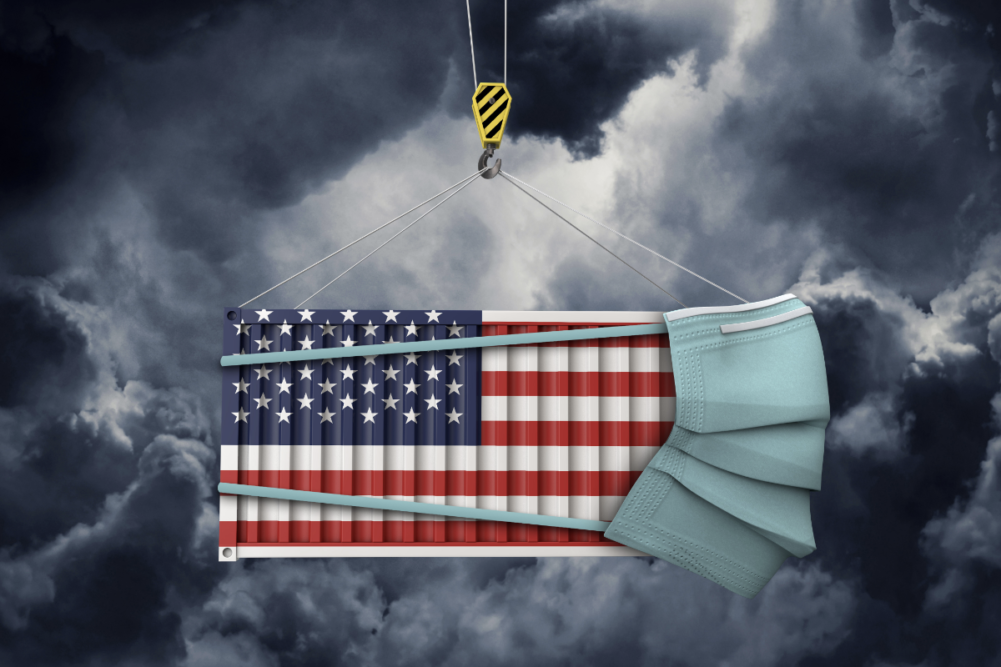The coronavirus (COVID-19) pandemic is stressing the food system in unprecedented ways. Within the United States, demand in the institutional feeding sector has collapsed, some meat processors have had to close and hunger has increased while food has gone to waste. Globally, some markets have seized up, trade flows have been disrupted and the threat of hunger in poorer developing countries has grown. New thinking may be needed to revive a well-functioning global food system.
The domestic market
In the United States, people were accustomed to consuming more than 50% of their calories away from home. COVID-19 has prompted states to lockdown retail businesses and issue “stay-at-home” orders, collapsing demand from restaurants, schools and other institutional feeding arrangements. Such a sudden collapse forced some farmers to dump milk and plow up fresh produce.
A surge in unemployment above 30 million people crimped demand further, increased lines at food banks and shifted demand toward more prepared and packaged foods. Even as states now begin to loosen their economic lockdowns, it is unclear how quickly and how substantially customers will return to eating out.
Development of COVID-19 “hot spots” in meat processing plants created another disruption in the food chain. Some farmers were forced to euthanize hogs that could not be processed in order to make room for the next batch of piglets. Food retailers in many cases also imposed purchase limits for meat to prevent consumer hoarding that would worsen the situation.
Immigrant workers, who account for about 70% of the labor force in hand-picked produce and 30% in meat processing plants, became another source of uncertainty, around both their general availability under temporary visa provisions and their own susceptibility to COVID-19 because of crowded housing and working conditions.
The overall US food supply was never seriously threatened by these disruptions, but it was severely stressed. At one point President Donald Trump used authority under the Defense Production Act to order meat processing plants back to work. His administration also tried to make clear that seasonal workers were still welcomed, even with the more general clampdown on immigration.
The global food system
The global food system has become increasingly dependent on trade, with an estimated one in five calories involving movement across national borders. US agriculture plays an important role in that global food system, both to find markets for the production of an estimated one in three acres of cropland and to supply consumers with fresh fruits and vegetables as well as diverse ethnic foods year-round.
A number of factors are stressing this global system. One is the increasing geopolitical tensions between China and the United States. Trade tensions in 2018-19 resulted in a Chinese boycott of US soybeans, an issue supposedly laid to rest by the “phase one” trade agreement signed earlier this year. Pressures to limit export of US high technology goods and intellectual property to China, accusations about the origins of the SARS CoV-2 virus and rising tensions in the South China Sea, however, may undo the Chinese commitment to import up to $50 billion in US agricultural products.
Chinese sensitivities around COVID-19 already have resulted in threats to Australian food exports. China has limited Australian beef imports under alleged sanitary concerns and imposed large import duties on Australian barley. Traditionally, China has taken more than half of Australia’s barley exports, a billion-dollar market. On other fronts, Vietnam announced plans to limit rice exports, then backed away, but Russia has put controls on its wheat exports for this crop year. Such actions raise the specter of widespread resort to food export controls.
Perhaps the most serious threat to the global food system posed by the pandemic is the impact it has had on policymakers’ thinking about national security. The Trump administration, as well as many in Congress, are questioning the wisdom of relying so heavily on China for key medical supplies, from personal protective equipment to drugs and chemicals needed to treat COVID-19. This has merged with ideas about ensuring that key industries — from steel and energy to artificial intelligence and space technologies — are supported and sustained at home.
An expanding definition of national security can be contagious. For example, President Emmanuel Macron of France has called on the European Community to be self-sufficient in food production, a longstanding ambition of the French to dominate the European market. Once this genie gets out of the bottle, it may be difficult to contain its spread and its danger to the global food system.
Supply reliability
The challenge with respect to food and other goods critical to a well-functioning economy is to strike a reasonable balance between efficiency and reliability. There is a middle ground between relying on a sole foreign supplier on the one hand and resorting to complete self-sufficiency on the other. The problem is that the focus on trade rules has been more on assuring access to markets than on assuring access to supplies.
The World Trade Organization’s current rules lack effective disciplines to prevent individual nations from taking self-protecting trade actions that unfairly and unpredictably disrupt other countries’ access to supplies.
Supply pressures, international disputes or disagreements and “industrial policy” preferences for supporting favored industries will continue to arise. In the absence of agreement to discipline such temptations, trade will contract, the global food system will suffer larger and more painful disruptions and the US food system will be less rewarding to farmers and less satisfying to consumers.
The alternative is to find ways to make the global trading system work better. With global supply chains of all sorts increasingly important to modern economies, the trading system needs rules for supply assurances, including penalties for non-compliance. One simple, common-sense rule would be to give regular foreign customers the same access to supplies as domestic ones. This would promote a healthier mutual reliance on trade in good and stressful times at far lower cost than everyone striving for self-sufficiency in their perceived critical needs.





